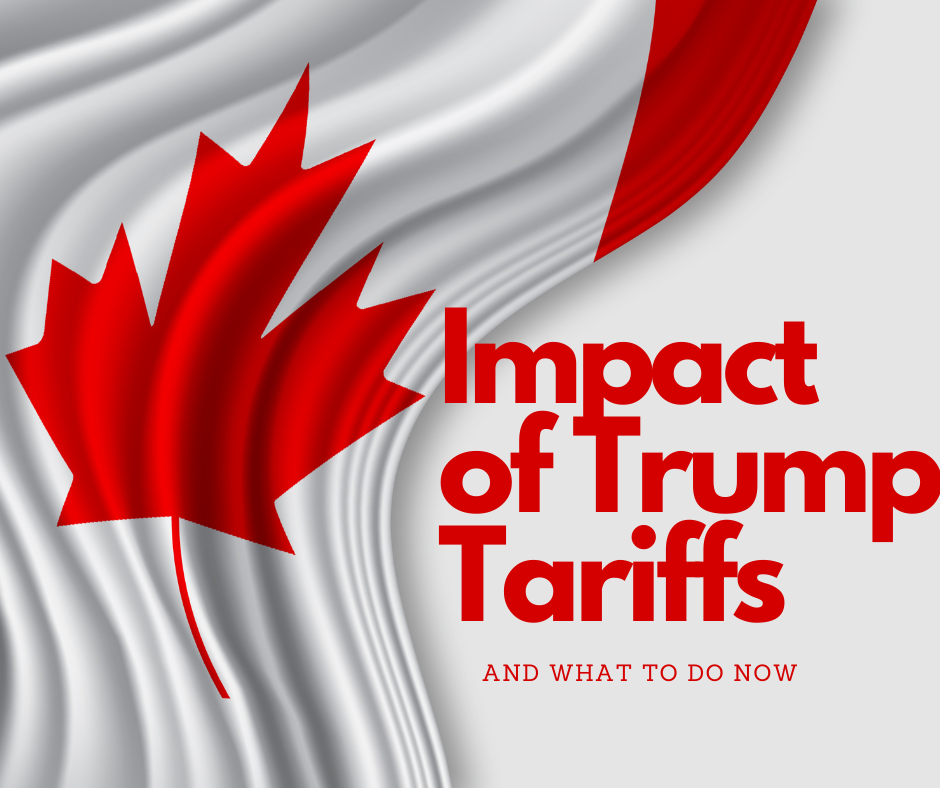The proposed 25% tariffs on Canadian imports to the U.S. have raised significant concerns about their potential impact on the Canadian economy. These tariffs could lead to increased costs for Canadian exporters, disruptions in key industries, and broader economic challenges. Here’s a deep dive into the economic repercussions and proactive measures small business owners can take to navigate this uncertain landscape.

Understanding the Impact of Trump’s Tariffs
If implemented, the 25% tariffs could have far-reaching effects across several areas of the Canadian economy.
Export-Driven Industries
Nearly 80% of Canadian exports go to the U.S., making the country heavily dependent on American demand. Tariffs would increase the cost of Canadian goods in the U.S. market, reducing competitiveness. Sectors like automotive, energy, agriculture, and lumber would face immediate pressure, with reduced demand potentially leading to job losses, especially in manufacturing and resource extraction. (Global News)
Economic Contraction
Canada’s GDP could shrink by up to 3% if tariffs are imposed, translating to a potential loss of $1,900 per person annually, according to the Canadian Chamber of Commerce. Integrated supply chains between the two countries would also face significant bottlenecks, harming industries like automotive and technology.
Inflation and Consumer Prices
Tariffs would likely increase costs for Canadian exporters and U.S. consumers of Canadian goods. This could reduce demand while higher production costs create inflationary pressures within Canada, compounding the economic strain. (AP News)
Trade Diversification Challenges
Although Canada has been working to diversify its trade relationships, U.S. demand is hard to replace quickly. Expanding exports to Europe or Asia involves logistical challenges and higher shipping costs, making diversification a long-term but necessary strategy. (Global News)
Canadian Dollar Volatility
Tariff uncertainty could weaken the Canadian dollar, increasing import costs and fueling domestic inflation. While a weaker currency might make Canadian goods cheaper internationally, U.S. tariffs would negate this advantage for American markets. (Reuters)
Retaliatory Measures
Canadian countermeasures could escalate trade tensions, harming industries dependent on U.S. imports or those targeted by retaliation. According to Reuters, Prime Minister Trudeau’s cabinet is preparing strategies for such scenarios. Increased tensions may also discourage cross-border investments.
Risk of Recession
Economists, including those at the Ivey Business School, estimate up to 500,000 job losses over two years, disproportionately affecting provinces like Ontario and Alberta. These challenges could push Canada into a recession, amplifying regional disparities. (NY Post)
How Small Business Owners Can Prepare Today

To navigate this uncertain landscape, small business owners should act decisively:
1. Strengthen Financial Resilience
Ensure you have sufficient cash reserves to absorb increased costs and disruptions. A financial cushion can help sustain operations through the initial impact of tariffs.
2. Diversify Supply Chains and Markets
Explore trade agreements with regions like the EU and Asia-Pacific. Developing new supplier and customer relationships outside the U.S. can reduce dependency and risk.
3. Optimize Business Operations
Review expenses and streamline operations to cut costs where possible. Understanding your financials is crucial for making informed decisions, including renegotiating contracts or adjusting staffing levels if necessary.
The Path Forward
While the situation remains fluid, staying informed and proactive is critical. Engage with industry associations, trade experts, and government advisories to adapt your strategies effectively. By preparing now, small businesses can weather this challenging period with greater resilience.
Latest Developments on Trump’s Proposed Tariffs and Canadian Response
- Canada Knows Trump Would Win a Trade Fight. It Is Preparing to Retaliate Anyway.
- Trudeau, facing disagreements over US tariff response, to convene cabinet
- Small business owners brace for Trump’s proposed tariffs
- US orange juice and steel will be on Canada’s list for retaliation if Trump imposes tariffs
- Trump’s tariff plan sparks economic concerns
Business owners need to take time over the next few days to evaluate the risks and begin planning to mitigate what they can. Reach out to industry partners, chambers of commerce, and your team to collectively assess the situation and identify actionable options for your business.











